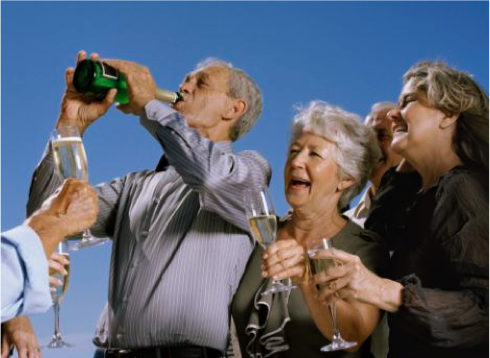Liquor Licenses for Senior Living Communities
The ability to serve beer, wine, and other alcohol appears to be a growing trend among retirement communities, according to Forbes contributor Robert Laura.
 “Deciding on a dry retirement home or one that serves booze adds to
the list of questions and situations retirees will need to consider, and
which won’t be as simple as the topic may initially suggest,” says
Laura in the column. “Undoubtedly, bingo would be more interesting, and
dinner conversations more dynamic with a Gin Rickey or dessert style
Sauterne but, beyond happy hour specials and the occasional champagne
brunch, how much extra would a stocked bar cost residents … and could
this trend equate to a good investment opportunity?”
“Deciding on a dry retirement home or one that serves booze adds to
the list of questions and situations retirees will need to consider, and
which won’t be as simple as the topic may initially suggest,” says
Laura in the column. “Undoubtedly, bingo would be more interesting, and
dinner conversations more dynamic with a Gin Rickey or dessert style
Sauterne but, beyond happy hour specials and the occasional champagne
brunch, how much extra would a stocked bar cost residents … and could
this trend equate to a good investment opportunity?”
A bill allowing municipalities to grant liquor licenses to senior living communities recently gained approval from the Massachusetts House of Representatives, Laura writes, at a time when the global alcoholic drinks industry is expected to top $1 trillion in 2014.
The 60-plus crowd has a “robust” drinking pattern, according to the National Health Interview Survey, with many drinking on a regular basis. About half of men polled and nearly four in 10 women drank almost every day.
“Thousands of boomers are retiring every single day, and they are not only likely to continue their drinking habits but also increase them as a result of boredom and their desire to ‘feel better,’” says the Forbes writer. “These facts suggest that underlying investment prospects look good for alcohol. … With many of these facilities already running restaurant-style dining, providing them with a state liquor license could be good for them and their residents, not to mention municipalities in need of additional revenue sources.”
Read the full column at Forbes.
 “Deciding on a dry retirement home or one that serves booze adds to
the list of questions and situations retirees will need to consider, and
which won’t be as simple as the topic may initially suggest,” says
Laura in the column. “Undoubtedly, bingo would be more interesting, and
dinner conversations more dynamic with a Gin Rickey or dessert style
Sauterne but, beyond happy hour specials and the occasional champagne
brunch, how much extra would a stocked bar cost residents … and could
this trend equate to a good investment opportunity?”
“Deciding on a dry retirement home or one that serves booze adds to
the list of questions and situations retirees will need to consider, and
which won’t be as simple as the topic may initially suggest,” says
Laura in the column. “Undoubtedly, bingo would be more interesting, and
dinner conversations more dynamic with a Gin Rickey or dessert style
Sauterne but, beyond happy hour specials and the occasional champagne
brunch, how much extra would a stocked bar cost residents … and could
this trend equate to a good investment opportunity?”A bill allowing municipalities to grant liquor licenses to senior living communities recently gained approval from the Massachusetts House of Representatives, Laura writes, at a time when the global alcoholic drinks industry is expected to top $1 trillion in 2014.
The 60-plus crowd has a “robust” drinking pattern, according to the National Health Interview Survey, with many drinking on a regular basis. About half of men polled and nearly four in 10 women drank almost every day.
“Thousands of boomers are retiring every single day, and they are not only likely to continue their drinking habits but also increase them as a result of boredom and their desire to ‘feel better,’” says the Forbes writer. “These facts suggest that underlying investment prospects look good for alcohol. … With many of these facilities already running restaurant-style dining, providing them with a state liquor license could be good for them and their residents, not to mention municipalities in need of additional revenue sources.”
Read the full column at Forbes.
Comments
Post a Comment